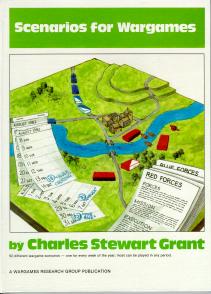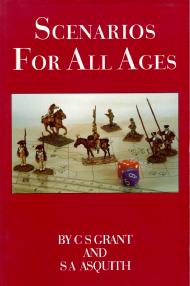
'Historical' Chapter

'Schild en Vriend' is an old Flemish battlecry, used in the rebellion of the city of Brugge against the French, May 18, 1302. Legend tells that it was used to differentiate between the French-speaking (who could not pronounce 'schild') and Flemish-speaking citizens. Nowadays, historians tell us that it was probably 'Des Gilden Vriend'.

Wargaming 101
|
 |  |
Objectives
Each player should have a clearly defined objective: capture a town; free an hostage; escape from an encirclement; escort a convoy. Even if the main objective is to just destroy the opponent, a little sideplot (which may be unknown to the other side) can add some fun to the game.
A good example can be found in our WW2 game The Battle for Gross-Untendorf. In this game, the Russian objective was to capture the town and destroy or capture as many German units as possible. At the same time, unknown to the Russians, the Germans had to smuggle out some precious pieces of art, including the Fallen Maddona with the Big Boobies.
Briefing
It certainly adds to the atmosphere of a game if each side receives a briefing or order from its higher command. If written in the style of the period, this can really inspire players to make up a better battle plan!
Characters and Units
In our games, all commanders of the troops available and their units usually have names. These names should not always be historically correct, but again, should at least capture the feel of the period.
Recurring Events and Characters
Characters and events that occured in one game, can be continued or recur in other games. This certainly adds an extra element. It somehow links different battles, without having to set-up a full campaign. We call this a narrative campaign. Games are linked through a common story, which is written up by the umpire, or even by different players. We are currently playing Full Thrust games linked together in a narrative campaign of the Human - Xirin war.
If a player represents a character, it is not uncommon to wear a nametag. The nametag shown below belongs to Admiral Bacchus Mahoney, serving in the Fleet of the Galactic Empire. He was awarded Imperial battle honours for shooting down well-known space pirate Stegner Regnix. However, in a following game, he was taken prisoner by the Gorn during the incident in the Delta-Omicron sector. In a subsequent game, he managed to escape from the slave labor camps on Segonis IV. All this is represented on his name tag, proudly worn by the player representing him in a game. It may even be a different player than the one who last played Bacchus Mahoney!

We even have a famous family that occurs in different settings and time frames. Sigisbiduwald von Trappstein-Hohenschlieffen is a starship commander serving the Galactic Empire in our Full Thrust games, but he also has two famous ancestors. Manfred von Trappstein-Hohenschlieffen is a World War 1 dogfighting ace, and his son Heinz von Trappstein-Hohenschlieffen is an officer in the German Army during World War 2. More on the illustrous von Trappstein-Hohenschlieffen (and soon more than you'd ever want to know about any family) can be found on their own page.

Home | This page was written by Phil Dutré and is maintained by
Bart Vetters Schild en Vriend Miniature Wargaming Club Leuven |